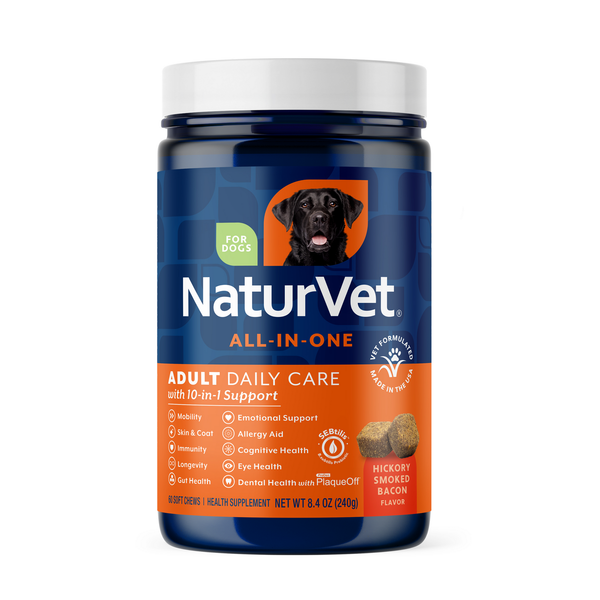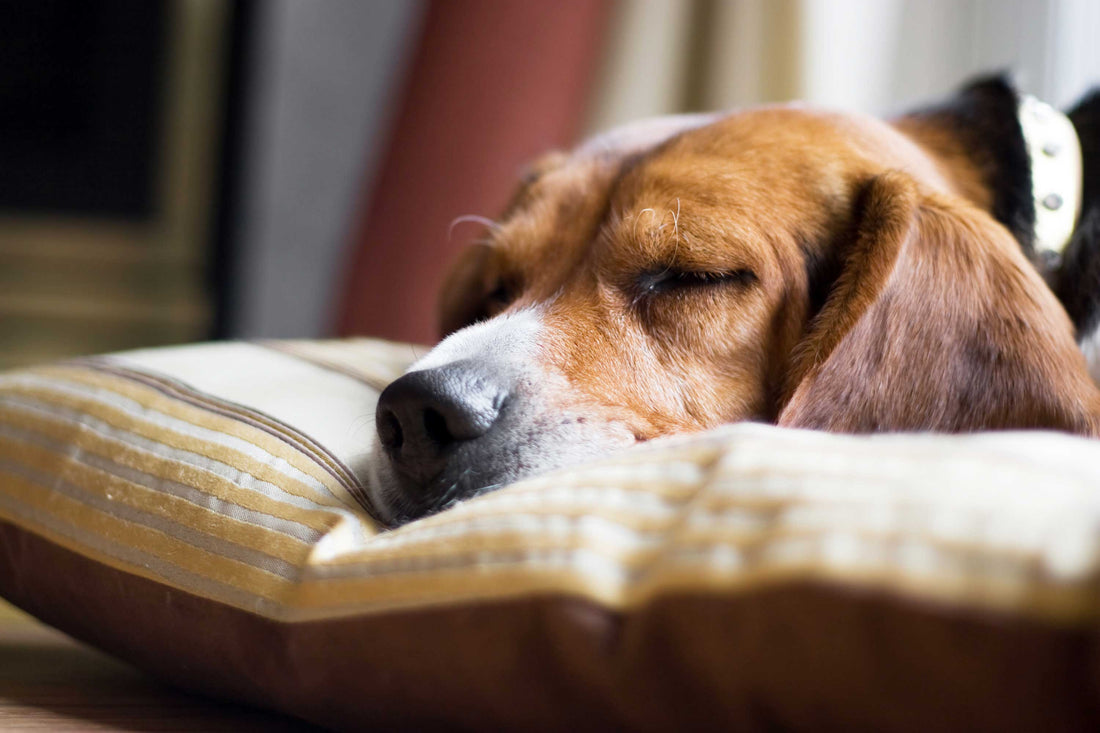Melatonin for Dogs: Do's & Donts
Melatonin is a popular supplement that many people take if they have trouble sleeping. It's purported to promote a restful, relaxed state, and help you snooze through the night. Many pet parents who favor the idea of ""what's good for me is good for my dog"" wonder if melatonin for dogs exists.
You might have heard that besides helping a dog sleep better, melatonin may also help with stress or anxiety and even some disorders of hair growth. The good news is that if you've heard this, you've heard right, but there's some details to go over.
In this article, we'll discuss what melatonin actually is, how it affects the body, and some benefits it can have for dogs. We'll also answer the question ""how much melatonin can you give a dog?""

What is Melatonin?
There is a tiny little gland called the pineal gland that sits at the base of the brain in a majority of animals. This gland's primary purpose is to produce melatonin.
Melatonin is a hormone that is involved with how the body responds to night and day cycles, which is termed ""circadian rhythm"". Primarily we think of this as our sleep cycles, where we humans are awake during the day and sleep at night.
But there are other features involved with the circadian rhythm as well, especially when we're talking about how much light there is during the day, or how little there is during the nighttime, because this changes with the seasons of the year too.
One example is seasonal shedding in pets. Many pup parents, especially those with nordic breeds like huskies or malamutes, can attest to how their dogs ""blow their coats"" during the fall to prepare for a winter coat, and again in spring to get rid of the winter coat in preparation for summer. These changes are in part signaled by how much light there is during the day, because this is how the body knows what time of year it is. The pineal gland is involved with this as well.
The signal to produce or decrease production of melatonin comes to the pineal gland initially via light receptors in the retina at the back of the eye. A very complex nerve pathway sends that signal along several relays until it reaches the pineal gland, which decides how much melatonin to produce.
This is a bit oversimplified, but hey, we're not trying to do a thorough anatomy and physiology lesson here. The important thing to know is that melatonin is part of a cycle that assists the body in different ways to respond appropriately to light cycles.
We also know that melatonin, being a hormone, can have effects on other hormones as well, including the stress hormone cortisol, serotonin, estrogen, testosterone, and others.
Can You Give a Dog Melatonin?
The short answer is, yes! You can give a dog melatonin. But it's not something that you necessarily need to supplement everyday if there's not a need for it. So next, we'll talk about some reasons why we might consider supplementing with melatonin.
Why Give a Dog Melatonin?
There are a couple of reasons why we might consider supplementing with melatonin for a pup. Mostly, there's three big categories pertaining to sleep cycles, anxiety, and hair growth.
Aah, Sleep
Folks that have pretty regular sleep cycles themselves should find that their pets adapt to having a similar schedule. Even pets that are more nocturnal, like cats, will usually rest a fair amount at night while their human companions sleep.
So if you notice that your dog seems very restless or anxious at night and isn't sleeping the way she used to, melatonin might help. Barring other medical issues like pain, high blood pressure, and others that can cause what appears to be restlessness, deficiencies and abnormalities in melatonin can occur that interrupt a normal circadian rhythm.
I sometimes appreciate this more during late spring and summer, as the days get longer. Melatonin production goes down when we're exposed to more light and longer days. Some dogs may have difficulty adjusting to these seasonal changes, with less melatonin being produced.
I'm Stressed Out
As mentioned, melatonin can have a calming effect. This is because, as a hormone that helps to promote sleep, it tries to prepare the body for rest.
This effect can be utilized for pups that are experiencing stress or anxiety and is sometimes very helpful in promoting a calm and relaxed demeanor.
Stress and anxiety disorders can have a wide scope and degree of severity, so it's important to understand that melatonin may not help in every case. In any situation where a pup suffers from separation anxiety, fear, or other disorders, it's important to include not just medical therapy, but behavioral modification therapy as well. This can be best achieved through discussion with your veterinarian who may advise getting a trainer or veterinary behaviorist involved as well.
But in general, melatonin is a safe thing to start with to see if it helps. I am always a fan of initially starting with some calming supplements and simple behavioral change tips to see if they help first before moving on to prescription medications and more advanced therapy.
Canine cognitive dysfunction (CCD) is a diagnosis we can arrive at in older, senior dogs, who start to develop abnormal behavioral changes seemingly out of nowhere and with no other medical explanation.
The disorder is similar to folks with dementia or Alzheimer's, where episodes of confusion and anxiety occur in familiar environments and situations. Examples include dogs let out in the backyard, where they've been for years, but seemingly start to get ""lost"" and unable to make it back inside.
Folks may also see episodes where a pup just doesn't seem to know where he is in the home, even though there's no signs of vision loss or other medical problems. And lastly, many folks will note increased restlessness and anxiety, particularly at night, with a pup wandering the house like she's looking for something she can't find.
While there is a prescription medication that exists for CCD, as well as prescription diets that have shown benefit as well, melatonin can be helpful to include, especially if we're seeing the abnormal nighttime behaviors.
Hairy Situations
We don't really think about it much as humans because our hair growth is just this continuous thing that keeps happening, but in animals, hair growth is actually very complicated.
As we all know, while there are some breed exceptions, most pets constantly shed hair. This is because, unlike us, pet hair goes through several phases of growth. A hair will grow to a maximum length, then will die and fall out. And as mentioned, the seasons can have a big part to play in larger shedding periods as the type of hair coat changes out.
Hormones also play a big role in hair growth, and this can include melatonin. Its influence is based on the duration of light cycles. Other hormones can also affect hair growth and interference can occur.
Melatonin can be considered in cases where hair growth appears to be very poor, including situations where, say, the winter coat fell out but the summer coat never really grew back in. Or, your pet gets clipped for the summer or shaved for a veterinary procedure, and his hair simply doesn't grow back.
There is also a condition called Alopecia X, which is a somewhat complicated and poorly understood symmetrical baldness that can occur in dogs, but which can respond to melatonin supplementation if other testing and therapies have not yielded promising results.
Because there are a lot of disorders that cause hair loss in dogs, both hormone related and non-hormone related, it's very important in these cases to not just jump to melatonin, but to consult with your veterinarian first.

How Do I Use Melatonin?
If you think your pup might need melatonin, there are some situations where starting a melatonin supplement on your own is probably okay, but others where consulting with your veterinarian is important first.
If your pup is experiencing signs of separation anxiety, phobias to certain planned events like fireworks or large parties, or if you're seeing her have trouble sleeping at night, consider starting with a low-dose melatonin supplement made for dogs.
Many folks will find success for mild conditions or targeted events where a light dose that doesn't cause heavy sedation, will do the trick.
If you're seeing issues with hair loss, it's best to consult with your veterinarian first. You should also consult with your vet if you feel that lower doses aren't helping or you feel that a much higher dose is needed.
Dosing melatonin in dogs, as with most medications, is based on weight. This can lead to vastly different doses for small or large dogs. For certain medical disorders, dosing also involves a range. The dosage for one dog for a hair loss disorder may differ for the dosage for cognitive dysfunction.
Melatonin's main purpose in the body is to promote sleep, so it can cause significant drowsiness. Our goal is always to balance positive effects with any level of sedation that is seen.
We also want to make sure that we're not trying melatonin in cases where it's not likely to help. Consulting with your vet can often get you on the right path much faster, instead of trying something yourself at home for a few weeks first. For example, if your dog is losing hair because of a skin infection, you can give as much melatonin as you want and it's not going to help.
Can I Overdose My Dog on Melatonin?
Fortunately, melatonin is a pretty safe supplement, with limited side effects. Because of its nature, the most common side effect seen is excessive drowsiness. Sometimes, this is the effect we actually want for sleep disorders or anxiety.
But in other cases, like hair loss or even cognitive dysfunction, no one really wants a vegetable for a pet, even if melatonin does seem to be helping the issue. This is why, if you're considering getting melatonin for your dog from the drug store it's important to consult with your vet first to get the right starting dose based on your pup's weight.
This is also why it can also be helpful to first start with a low-dose supplement, which is combined with other natural beneficial calming ingredients.
We generally want to avoid use of melatonin for dogs who are sexually immature, like puppies, and pups who may be involved with breeding or who are currently pregnant. Melatonin interacts with other hormones like testosterone, estrogen, and progesterone. In sexually mature, spayed or neutered pets, any interactions it has are likely negligible, especially as compared to the benefits it has.
But in pups that still require a lot of hormone influence for growth and development, or for dogs involved with breeding, these changes could cause serious problems. If melatonin decreases progesterone during pregnancy for example, this could lead to pregnancy loss.
We should also be cautious in using melatonin if a pup is already on a sedative or antidepressant, as it may lead to additive effects like excessive drowsiness or apathy. For example, melatonin can increase serotonin levels, so for a dog on a selective serotonin reuptake inhibitor (SSRI) like fluoxetine, we could see further increased serotonin levels.

Keep Calm and Carry On
Melatonin is generally safe to use and can be very helpful in many cases, especially as a place to start for calming and better sleep.
I commonly field calls with clients calling on behalf of their pups who want to know if starting melatonin might help with something they're seeing at home. I'm usually more than happy to advise when I have a standing relationship with the pooch and I've been filled in with what's going on.
So it's always best to discuss your thoughts first with your vet before sharing your own supply with your pooch. That said, it's great when something as simple as melatonin can help give everyone, human and canine alike, a good night's sleep.
JOIN OUR PACK
Follow us @NaturVet on social media to fill us in on any tips we might have missed. And, check out the rest of NaturVet.com. We’ll keep you up to date on all our latest pet resources, supplements, tips and tricks, and more – everything you need to be the best pet parent possible.























